Nature, Space, and Politics
- About
- People
- Meetings
- News
- Affiliated Groups
- Contact
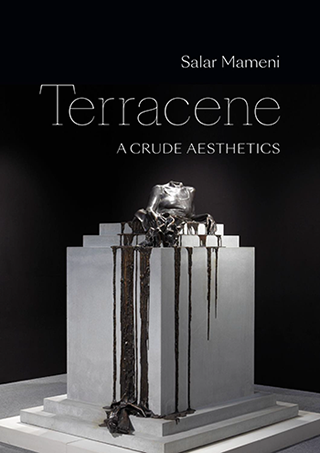
Thursday, May 15, 3:00-4:30 pm
de Certeau Room, RWAC 335

Salar Mameni is an art historian specializing in contemporary transnational art and visual culture in the Arab/Muslim world with an interdisciplinary research on racial discourse, transnational gender politics, militarism, oil cultures and extractive economies in West Asia. Mameni is the author of Terracene: A Crude Aesthetics (Duke, 2023), which considers the emergence of the Anthropocene as a new geological era in relation to the concurrent declaration of the War on Terror in the early 2000s. Playing on the words “terror” and “terra,” Mameni proposes the term “Terracene” in order to think of the planetary in conjunction with ongoing militarization of transnational regions under terror. The book engages contemporary art and aesthetic productions, paying particular attention to artists navigating the geopolitics of petrocultures and climate change.
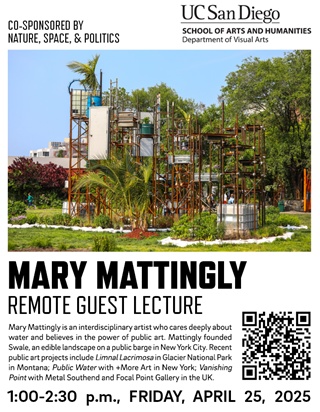
Remote Artist Talk: Mary Mattingly
Friday April 25, 2025, 1:00-2:30pm
(Information and RSVP)
In collaboration with the Department of Visual Arts, we are pleased to co-sponsor a remote artist talk by Mary Mattingly, an interdisciplinary artist who cares deeply about water and believes in the power of public art. Mattingly founded Swale, an edible landscape on a public barge in New York City. Recent public art projects include Limnal Lacrimosa in Glacier National Park in Montana; Public Water with +More Art in New York; Vanishing Point with Metal Southend and Focal Point Gallery in the UK.
This lecture is introduced and moderated by Dr. Pinar Yoldas, an infradisciplinary designer/artist/researcher and Associate Professor, and head of the Speculative Design Area in the Department of Visual Arts. Respondents: Joe Riley and Sarah Rose of the PhD Program in Art History, Theory and Criticism with a Concentration in Art Practice.
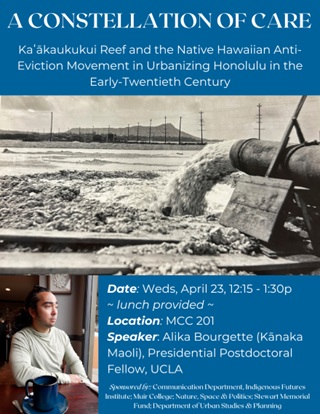 A Constellation of Care: Kaʻākaukukui Reef and the Native Hawaiian Anti-Eviction Movement in Urbanizing Honolulu in the Early-Twentieth Century
A Constellation of Care: Kaʻākaukukui Reef and the Native Hawaiian Anti-Eviction Movement in Urbanizing Honolulu in the Early-Twentieth Century
We are pleased to co-sponsor this talk with Alika Bourgette, Kanaka Maoli (Native Hawaiian) historian and scholar of Native American and Indigenous Studies from Āliamanu, Oʻahu. He received his Ph.D. from the University of Washington in Spring 2024, and is currently a President’s and Andrew W. Mellon Postdoctoral Fellow in the UCLA Department of Asian American Studies (2024-2025). His research historicizes the long struggle for Native Hawaiian land and water justice along the urbanizing Honolulu waterfront in the early twentieth century. His work demonstrates how Indigenous lands and waters themselves participated as important agents in feeding and protecting all against the shifting winds of colonization. He documents how Native Hawaiians of multiple genders developed expanded kin and food networks from mountains to sea to braid a constellation of care and anti-eviction efforts across Honolulu.
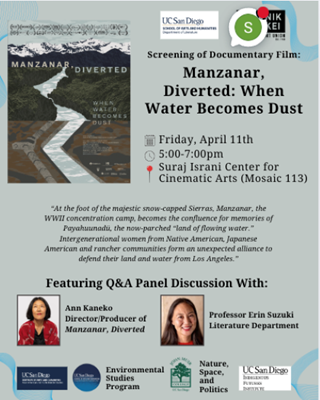 Friday April 11, 2025, 5:00-7:00 p.m.
Friday April 11, 2025, 5:00-7:00 p.m.
Be on the lookout for information on upcoming reading groups and a special year-end event! Sign up for our mailing list to keep updated and join our meetings.
Below is a summary of our past meetings and events.
NSP “Constellation of Care” Reading Group with Prof. Megan Ybarra
Friday, April 18th, Noon-2:00 p.m., Climate Action Lab (PEB 116)
(Lunch Provided)
In conjunction with the ‘Constellation of Care” talk with Alika Bourgette on April 23rd (see below), Prof. Megan Ybarra (Communication, UCSD) will be leading the first of our Spring 2025 reading groups engaging with the following curated materials:
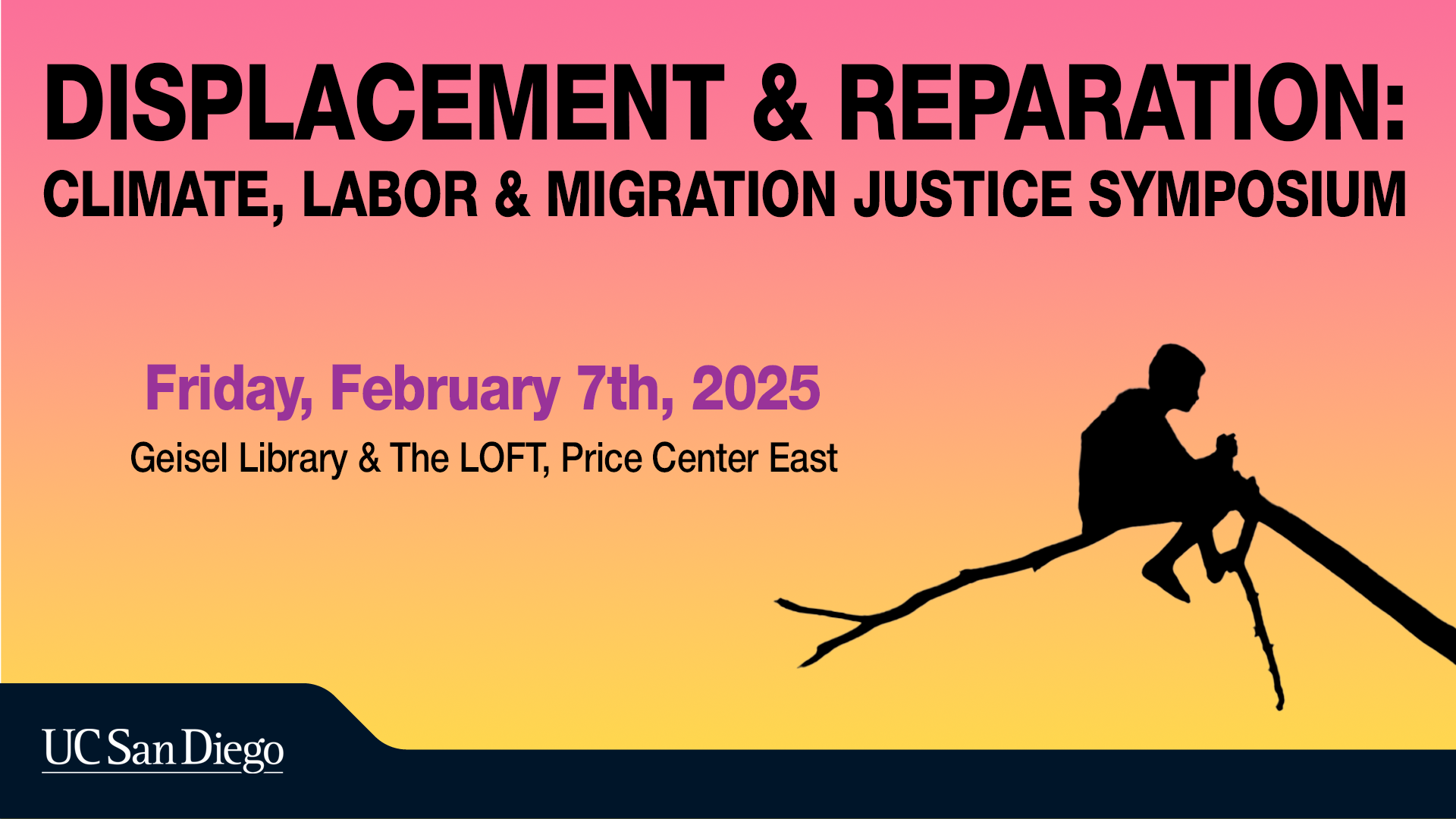
Winter Symposium! Friday, February 7th, 2025: The full program for our Winter 2025 Symposium is still available, including speaker information, resources and our schedule of events.
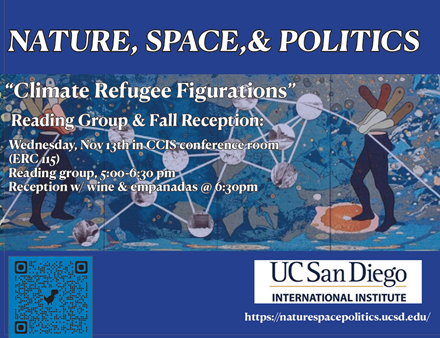
Wednesday, November 13th, 5:00pm: Join us for our Fall NSP Reading Group: "Climate Refugee Figurations" on Wednesday, November 13th, 5:00-6:30pm, followed by a Reception with Wine & Empanadas @ 6:30pm in the CCIS Conference Room (ERC 115).
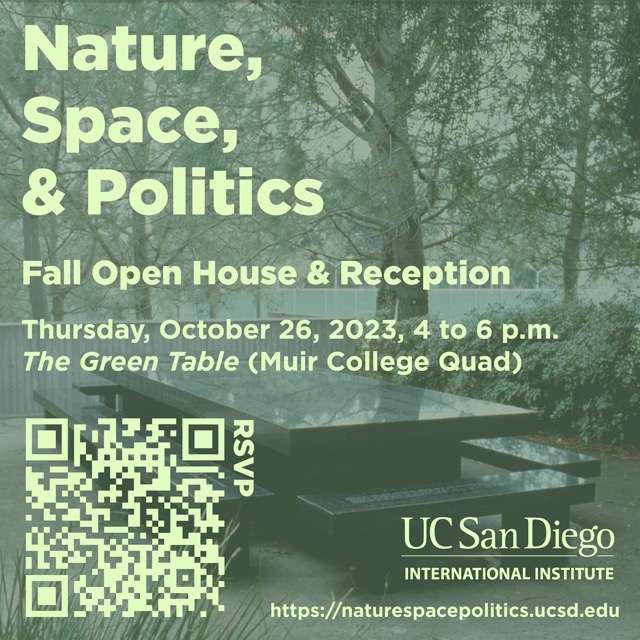
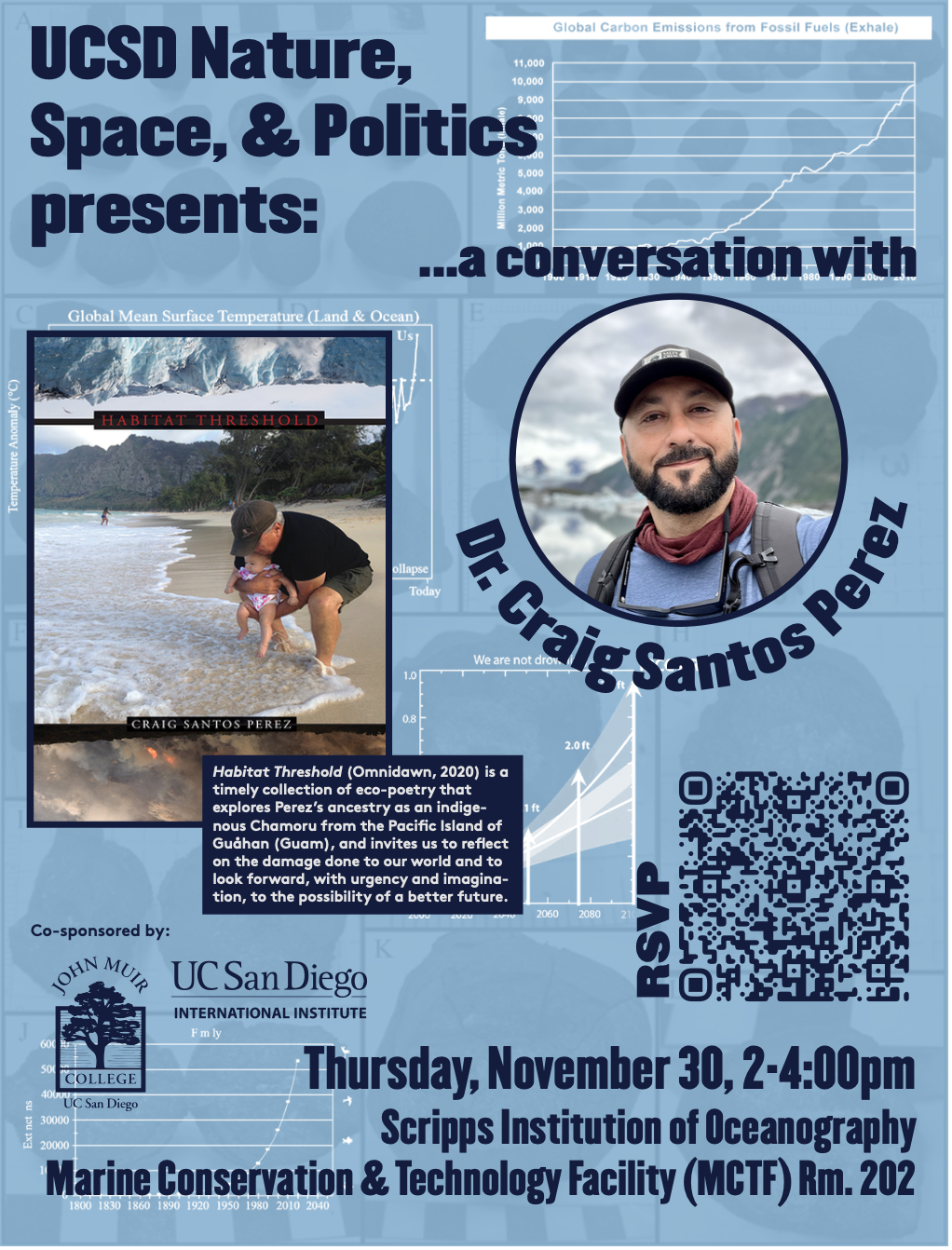
November 30, 2023, 2-4:00 pm: Please RSVP to join us in MCTF Conference Room 202 (Scripps Institution of Oceanography) for an NSP event with Dr. Craig Santos Perez centered around the collection of eco-poetry in his book Habitat Threshold.
Perez is from the Pacific Island of Guåhan (Guam). He is the co-editor of seven anthologies, including Indigenous Pacific Islander Eco-Literatures. He is also the author of six books of poetry and the monograph Navigating Chamoru Poetry: Indigeneity, Aesthetics, and Decolonization.
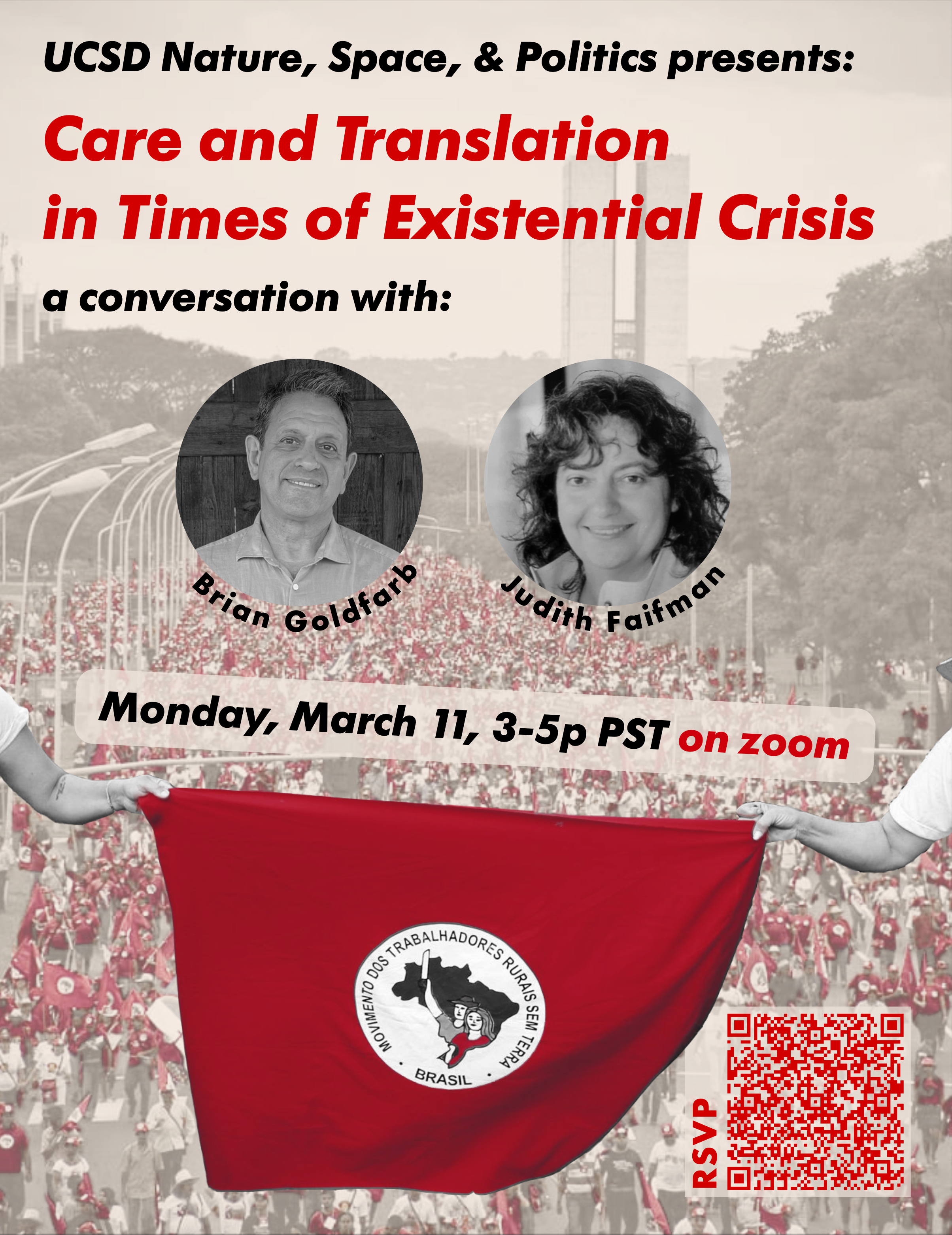
Monday, March 11, 3-5 pm (on zoom only): Join us in a conversation with Brian Goldfarb and Judith Faifman. To receive a zoom link, RSVP here.
In their talk, "Care and Translation in Times of Existential Crisis,” Goldfarb and Faifman take as an example forms of mobilization in Latin America by groups such as the Landless Rural Workers Movement and La Via Campesina, to explore how experiences of translation, interpretation, and interconnectedness embed care mediation in public processes of problematization. Goldfarb and Faifman argue that in the context of heightened threats to human well-being and environmental health at local, regional, and global scales, we are witnessing the emergence of sustained collaborative networked efforts that reconfigure the relationships between academic and non-academic actors and intertwine scholarship with activist and citizen media. Fundamental to the emergence of these networks are forms of translation across modes of existence and styles of inquiry that their constituents enact as they strive to articulate shared understandings of hurdles and goals (“care problems”). The analysis of participation in long-termist social movements in Latin America and globally allows us to characterize care problem posing as the relational and processual coproduction of multidimensional understanding of situated and interdependent problems. A process that entails the acknowledgement of viable alternative solutions, while making explicit the principles and criteria of decision making, monitoring the impacts of interventions, and assessing the equity and sustainability of modes of resolution.
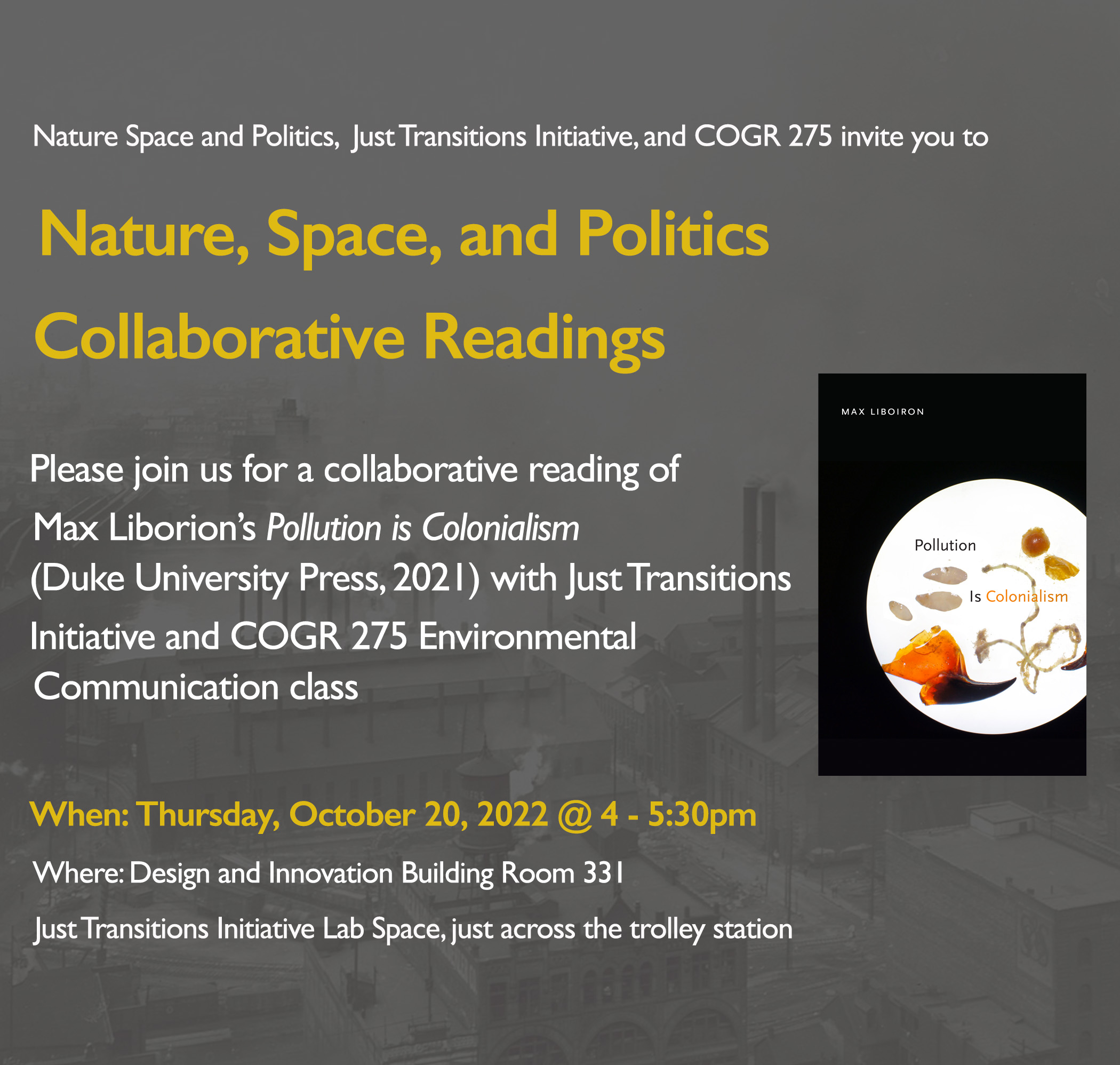
Thurs. Oct. 20, 4-5:30 pm: NSP, Just Transitions and COGR 275. Environmental Communication Collaborative Reading: On Max Liboiron's Pollution Is Colonialism. We are not assigning specific pages, so read any selections that pique your curiosity. Optional to also read the CLEAR Lab's Manual which outlines their research praxis. Meeting will be held in the JTI Lab rm. 331 (Design and Innovation building- across from the Trolley station).
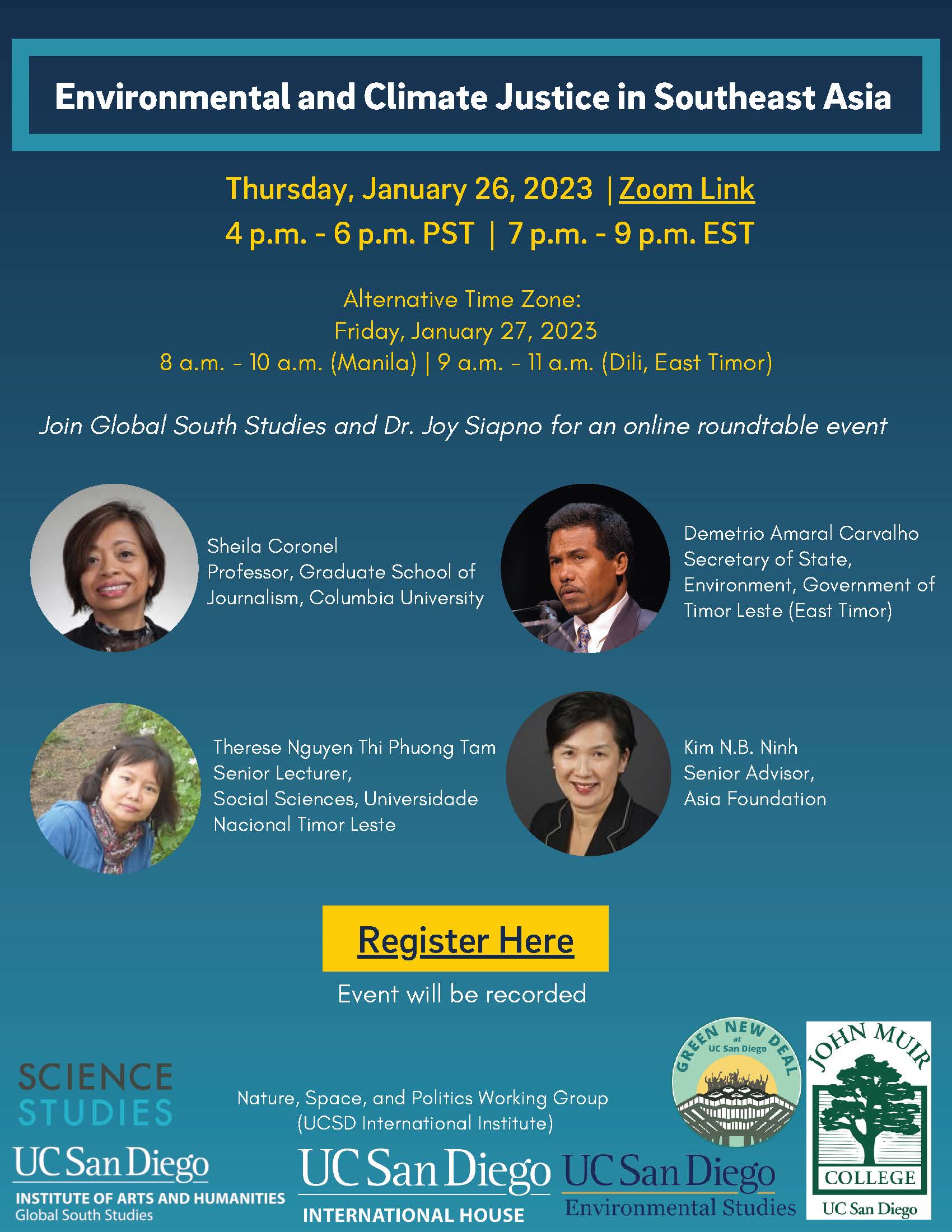 Thursday, Jan. 26, 4-6pm: Please join us for a zoom roundtable on Climate and Environmental Justice in SE Asia. It will feature a fantastic and diverse group of speakers, including a leading journalist and a former Goldman Prize EJ winner from East Timor. This event is organized by Global South Studies and co-sponsored by NSP and a number of other organizations across campus.
Thursday, Jan. 26, 4-6pm: Please join us for a zoom roundtable on Climate and Environmental Justice in SE Asia. It will feature a fantastic and diverse group of speakers, including a leading journalist and a former Goldman Prize EJ winner from East Timor. This event is organized by Global South Studies and co-sponsored by NSP and a number of other organizations across campus.
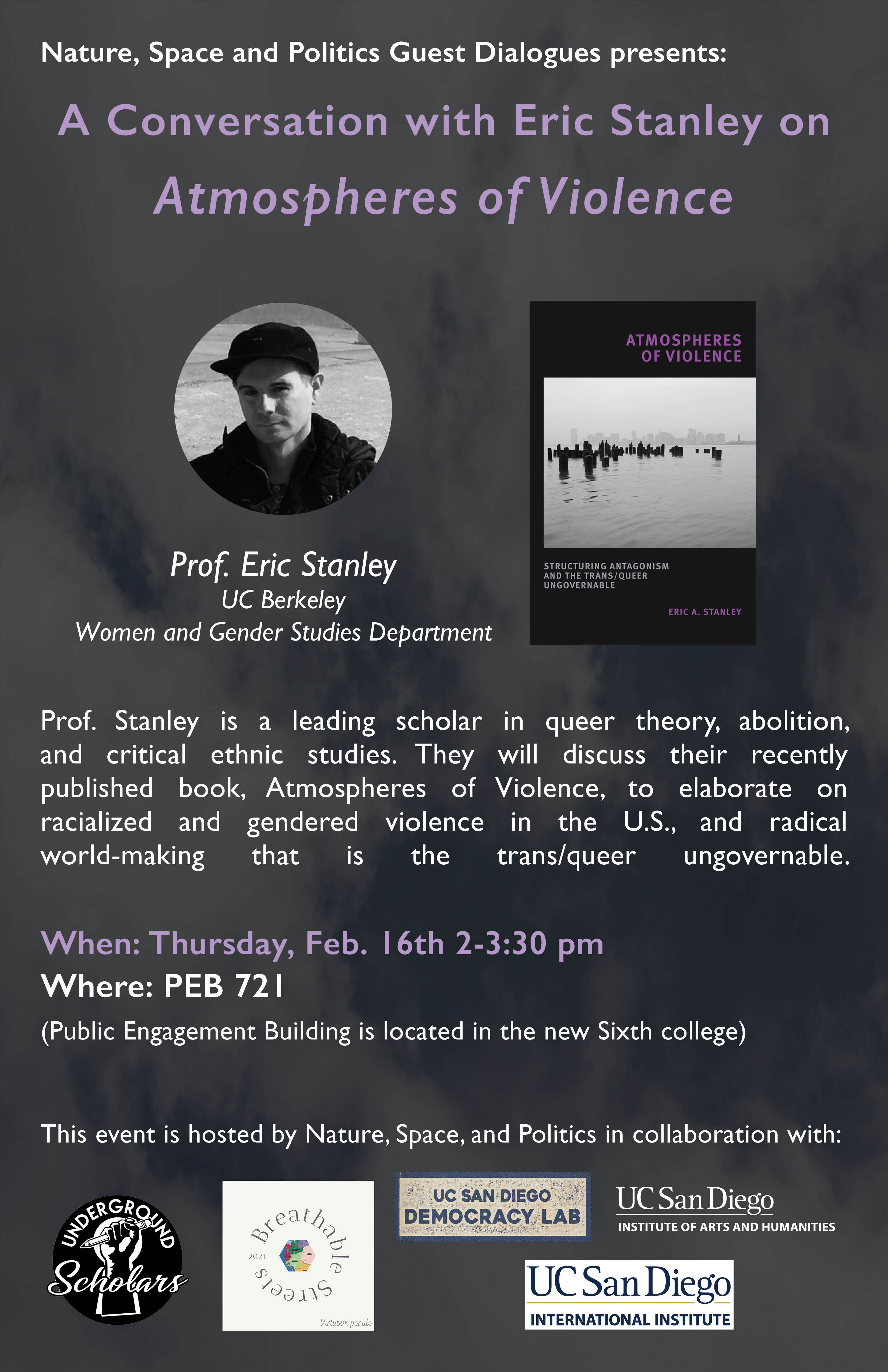 Thursday, Feb. 16, 2- 3:30pm at PEB 721 (Public Engagement Building, located in the new Sixth College): We are very excited to kick off Winter Qtr. Nature, Space, Politics events with a book discussion of Prof. Eric Stanley's new book, Atmospheres of Violence: Structuring Antagonism and the Trans/Queer Ungovernable. This event is co-sponsored by the Triton Underground Scholars, Breathable Streets, the Communication Department's Democracy Lab, and the Institute of Arts and Humanities.
Thursday, Feb. 16, 2- 3:30pm at PEB 721 (Public Engagement Building, located in the new Sixth College): We are very excited to kick off Winter Qtr. Nature, Space, Politics events with a book discussion of Prof. Eric Stanley's new book, Atmospheres of Violence: Structuring Antagonism and the Trans/Queer Ungovernable. This event is co-sponsored by the Triton Underground Scholars, Breathable Streets, the Communication Department's Democracy Lab, and the Institute of Arts and Humanities.
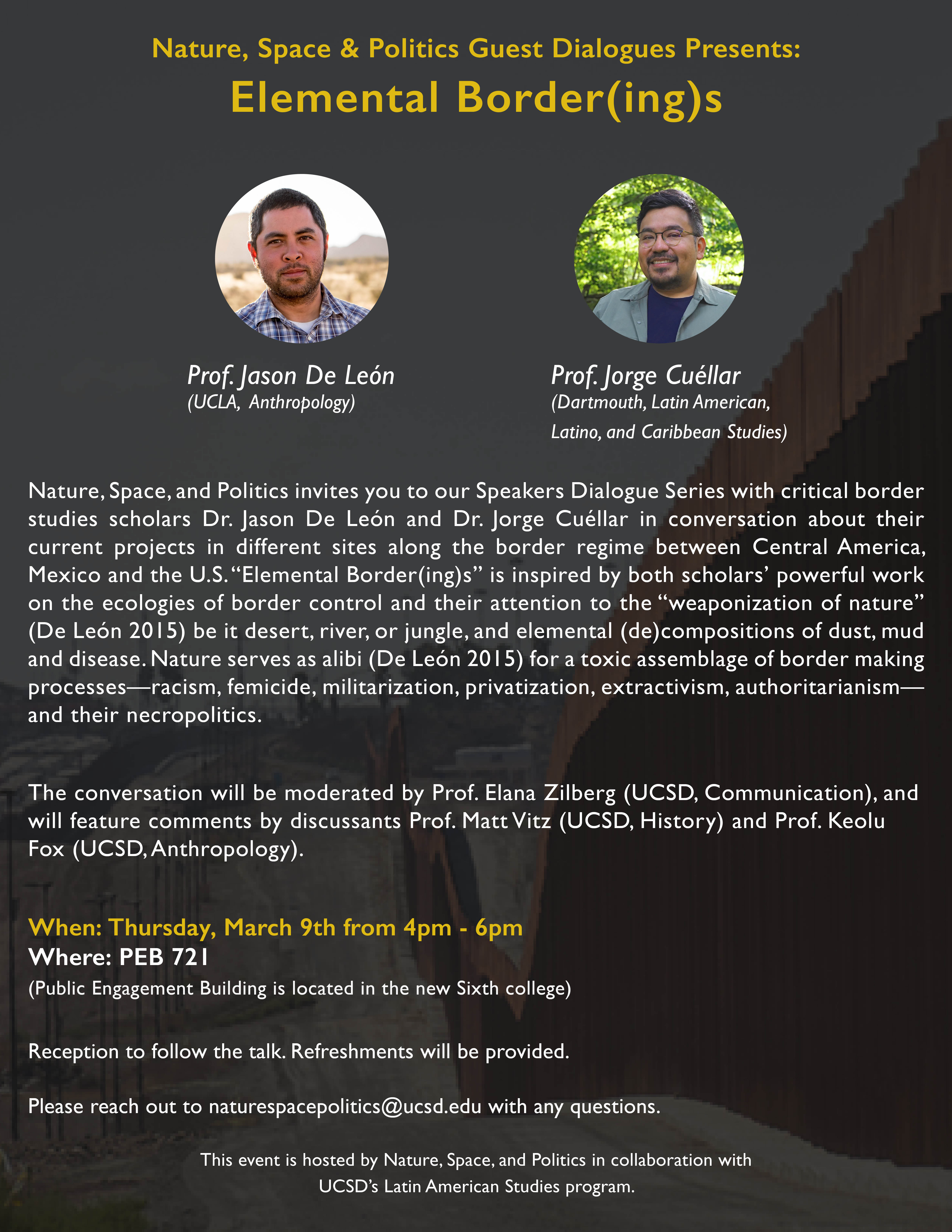 Thursday, March 9, 4- 6pm at PEB 721: Please join us for our Speakers Dialogue Series with critical border studies scholars Dr. Jason De León and Dr. Jorge Cuéllar in conversation about their current projects in different sites along the border regime between Central America, Mexico and the U.S. “Elemental Border(ing)s” is inspired by both scholars’ powerful work on the ecologies of border control and their attention to the “weaponization of nature” (De León 2015) be it desert, river, or jungle, and elemental (de)compositions of dust, mud and disease. Nature serves as alibi (De León 2015) for a toxic assemblage of border making processes—racism, femicide, militarization, privatization, extractivism, authoritarianism—and their necropolitics. The conversation will be moderated by Prof. Elana Zilberg (UCSD, Communication), and will feature comments by discussants Prof. Matt Vitz (UCSD, History) and Prof. Keolu Fox (UCSD, Anthropology).
Thursday, March 9, 4- 6pm at PEB 721: Please join us for our Speakers Dialogue Series with critical border studies scholars Dr. Jason De León and Dr. Jorge Cuéllar in conversation about their current projects in different sites along the border regime between Central America, Mexico and the U.S. “Elemental Border(ing)s” is inspired by both scholars’ powerful work on the ecologies of border control and their attention to the “weaponization of nature” (De León 2015) be it desert, river, or jungle, and elemental (de)compositions of dust, mud and disease. Nature serves as alibi (De León 2015) for a toxic assemblage of border making processes—racism, femicide, militarization, privatization, extractivism, authoritarianism—and their necropolitics. The conversation will be moderated by Prof. Elana Zilberg (UCSD, Communication), and will feature comments by discussants Prof. Matt Vitz (UCSD, History) and Prof. Keolu Fox (UCSD, Anthropology).
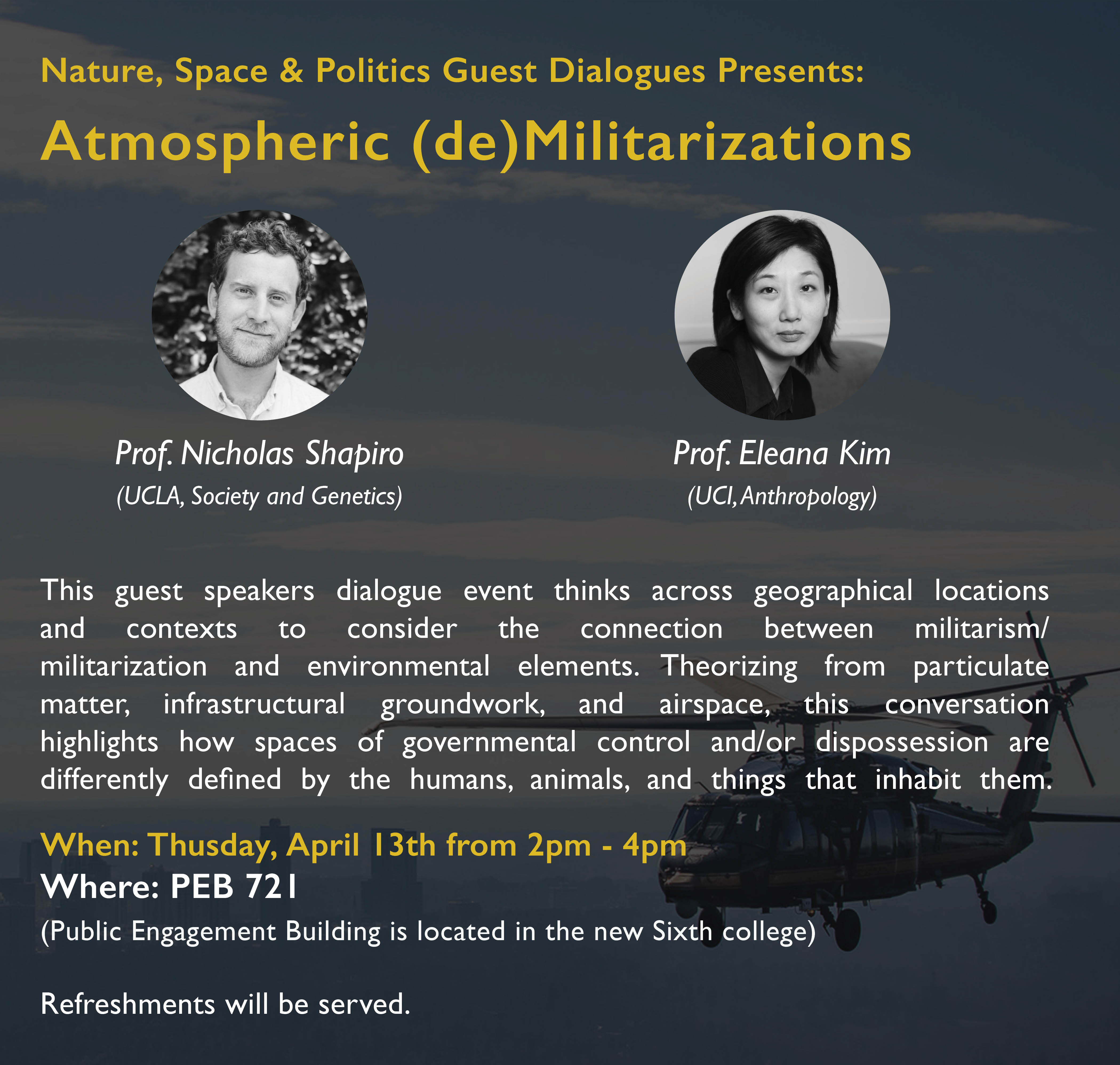
Thursday, April 13, 2-4 pm at PEB 721: We are very excited to host the next NSP meeting, Atmospheric. (de)Militarizations featuring Prof.s Eleana Kim (UCI, Anthropology) and Nicholas Shapiro (UCLA, Society and Genetics). In conversation with the guest speakers, this meeting will think through the human and more-than-human contributors to spaces of militarism/militarizations. Both scholars use ecological thinking to grapple with the production, complexity, and politics that composes militarized contexts and spaces. This conversation is an opportunity to engage with multiple environmental elements- toxicants, birds, invertebrates, surveillance technologies, people- to think through the multiple humans/animals/things that certainly shape and are shaped by, yet not entirely beholden to, state infrastructures and delineations.
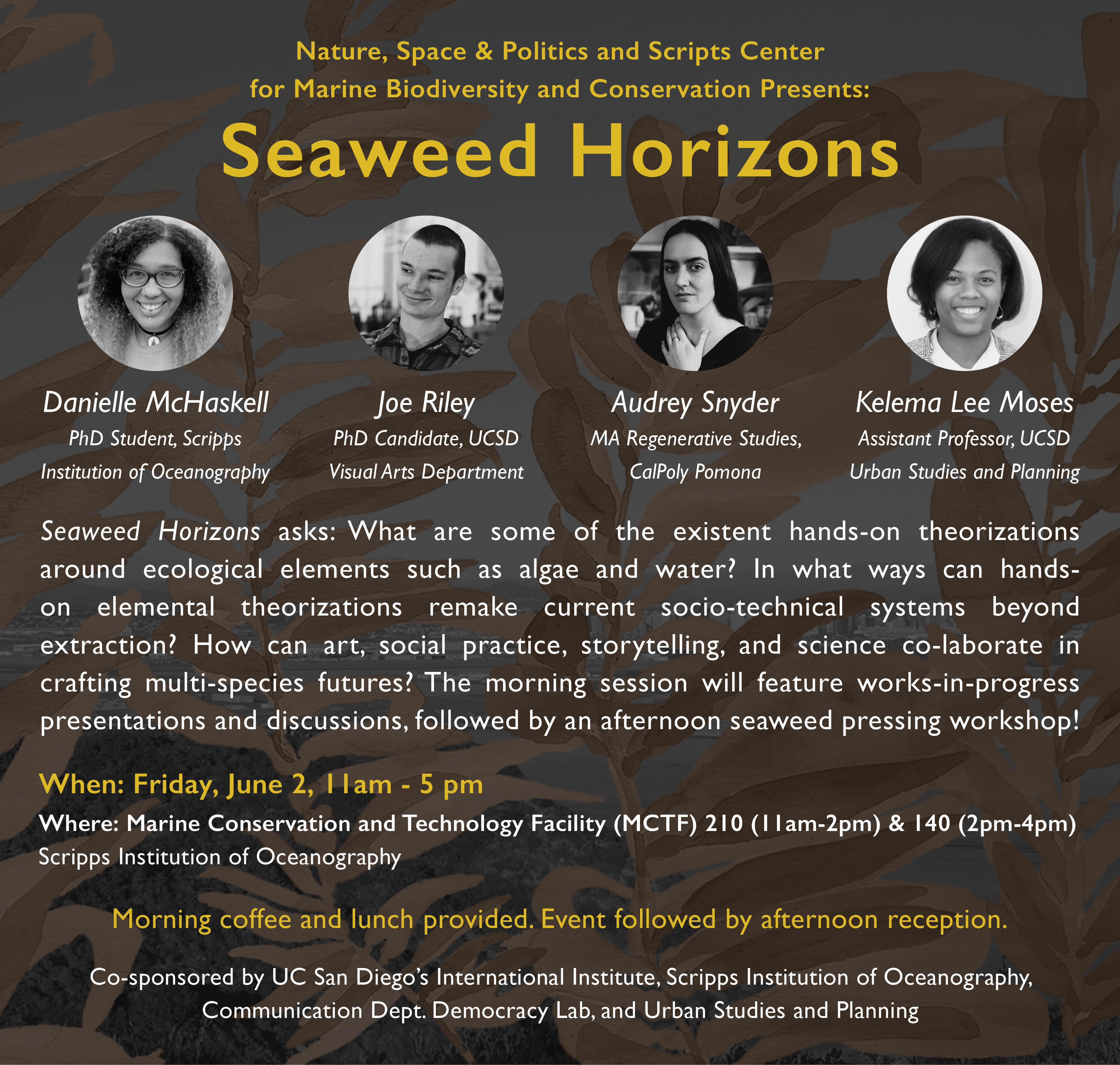
Friday, June 2, 11 am - 6 pm at MCTF 210: Please join Nature, Space and Politics, Urban Studies and Planning, and Scripps Center for Marine Biodiversity and Conservation at UC San Diego for Seaweed Horizons, an interdisciplinary, hands-on workshop gathering together scholars and scientists on the matter(s) and agency of errant marine algae.
Taking marine algae as a framework for critique of the characterization of species as “non-native” and “invasive,” artist/writer Joe Riley, artist/chef Audrey Snyder, and scientist/activist Danielle McHaskell collaboratively explore the hydropolitical ecology of out-of-place seaweeds. An interdisciplinary “co-laboratory,” Passengers of Change,considers these characterizations as points of contact for boundary work between artists and scientists in the study of improvisational and historical patterns of colonization across human and nonhuman systems inviting us to think with the transportation and archiving of seaweed biota and photographic and phycological materials at the Scripps Institution of Oceanography Archives.
This is a day-long event at Scripps including:
11am :Coffee and Welcome (MCTF 210)
11:30-1pm: Guest speaker dialogues with artist/writer Joe Riley, artist/chef Audrey Snyder, scientist/activist Danielle McHaskell & discussant Prof. Kelema Lee Moses (11.30-13.30pm MCTF 210)
1-2 pm: Catered lunch (MCTF 210, patio)
2-4 pm: Hands-on Seaweed Pressing Workshop (2-4 MCTF 140). Please wear leg covering and closed-toe shoes if joining for this per lab requirements.
4-6pm: NSP end of quarter reception (4-6pm MCTF 140, patio).
Reading & Informal Discussion Session on Tuesday Oct 12th (4:00 p.m. - 5:30 p.m. PDT @ zoom). For our first meeting of the year, we convine to discuss two readings and building upon the following provocations: what is border(ing) as method? How is it performed? Who can perform it? Why do border(ing)s matter/or not/beyond geographical & institutional borders?
Guest Speakers Lorena Gómez Mostajo, Rihan Yeh, and David Morison Portillo to discuss the recent publication of Border Looping/ Vueltas Fronterizo. The book discusses David's performance-protest crossing the US-Mexico border, and our conversation can expand on questions such as: What was the experience of doing the performance-protest? What editorial decisions went into the book's publication? How are the multiple forms of border(ing)s expressed in this act and book? What is the relation between transgression and refusal?
We urge you all to support Taller California, and purchase this wonderful book directly through them! You can find a copy to purchase at: https://tallercalifornia.
Standing Ground, Slowing Down, and Refusals to Extractivism in Kumeyaay Land. Tuesday, Dec. 7 from 2-3:30 pm Nature, Space, Politics hosts a conversation with Bobby Wallace, a leader of the Barona Band of Mission Indians. Wallace is an active organizer, involved in sending support from San Diego to Standing Rock, and in countering the SD-TJ border wall. Our conversation will emphasize the ways in which the border crosses Kumeyaay land, and the various practices of resistance and refusal against such division. We will focus attention on the extractive practices of borders, refusals to State borders, and contemporary Kumeyaay activism against the State bordering process. This meeting will also feature Prof. Boatema Boateng (Communication) and Prof. Cathy Gere (History; UCSD Green New Deal) as discussants. There is no reading for this event; please come prepared to listen and engage in conversation.
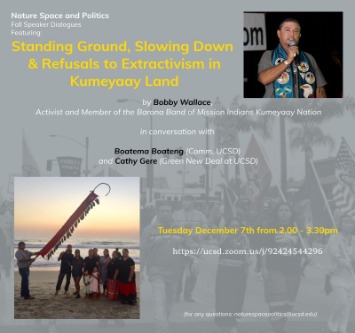
Book discussion of Matilde Córdoba Azcárate's new book on Wednesday, May 12th from 10:00 a.m. - Noon (PDT) at this zoom link. We are delighted to invite you to join us for a lively virtual conversation in celebration of Dr. Matilde Córdoba Azcárate’s new book, Stuck with Tourism: Space, Power and Labor in Contemporary Yucatán (UC Press 2020) with the author and Drs. Bianet Castellanos, Chandra Mukerji, Mimi Sheller, and Manuel Xool Koh. With many thanks to our co-sponsors, the International Institute, Communication Department, Global Indigenous Peoples Group, Center for Iberian and Latin American Studies, the Latin American Studies Program, and the Center for U.S.-Mexican Studies.
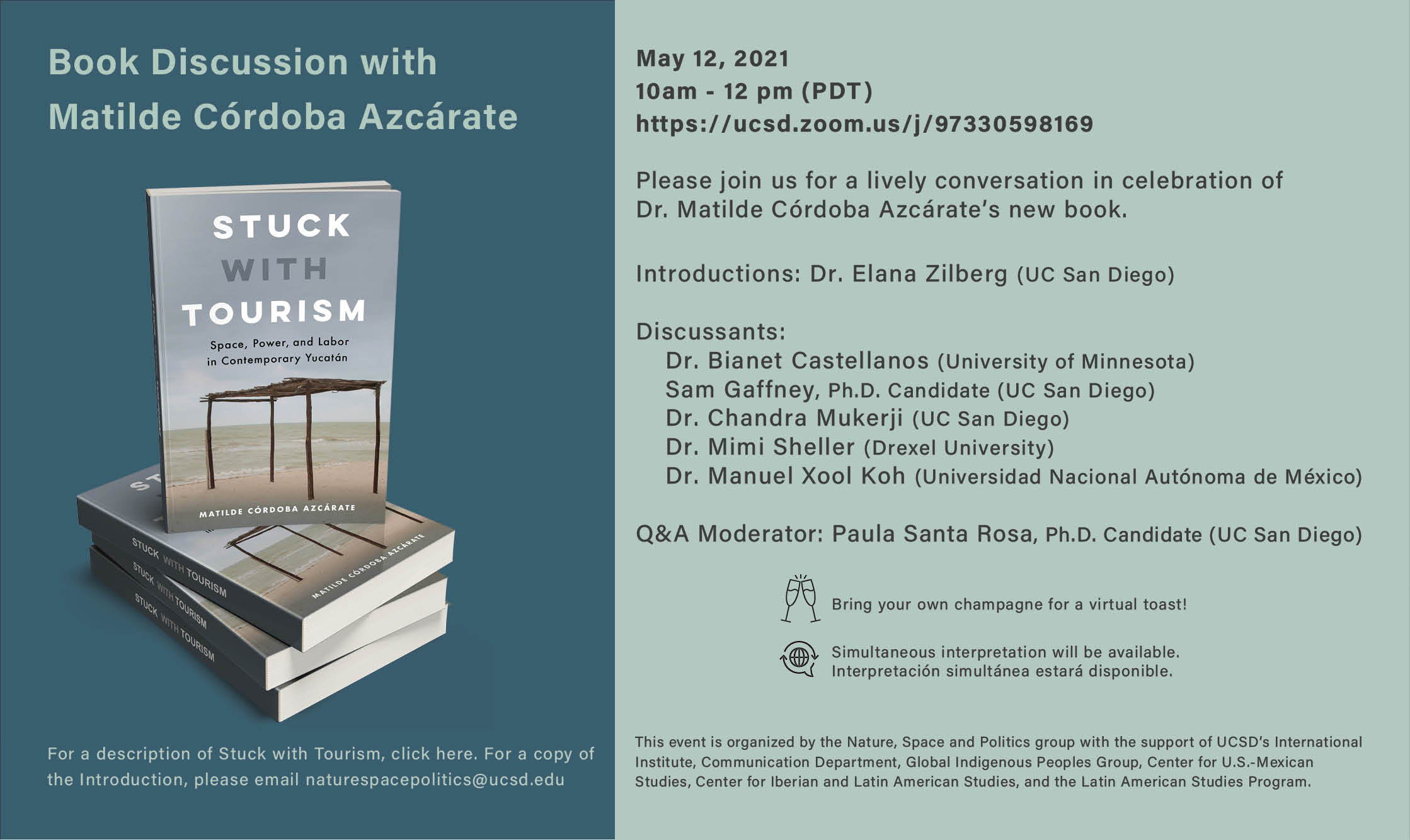
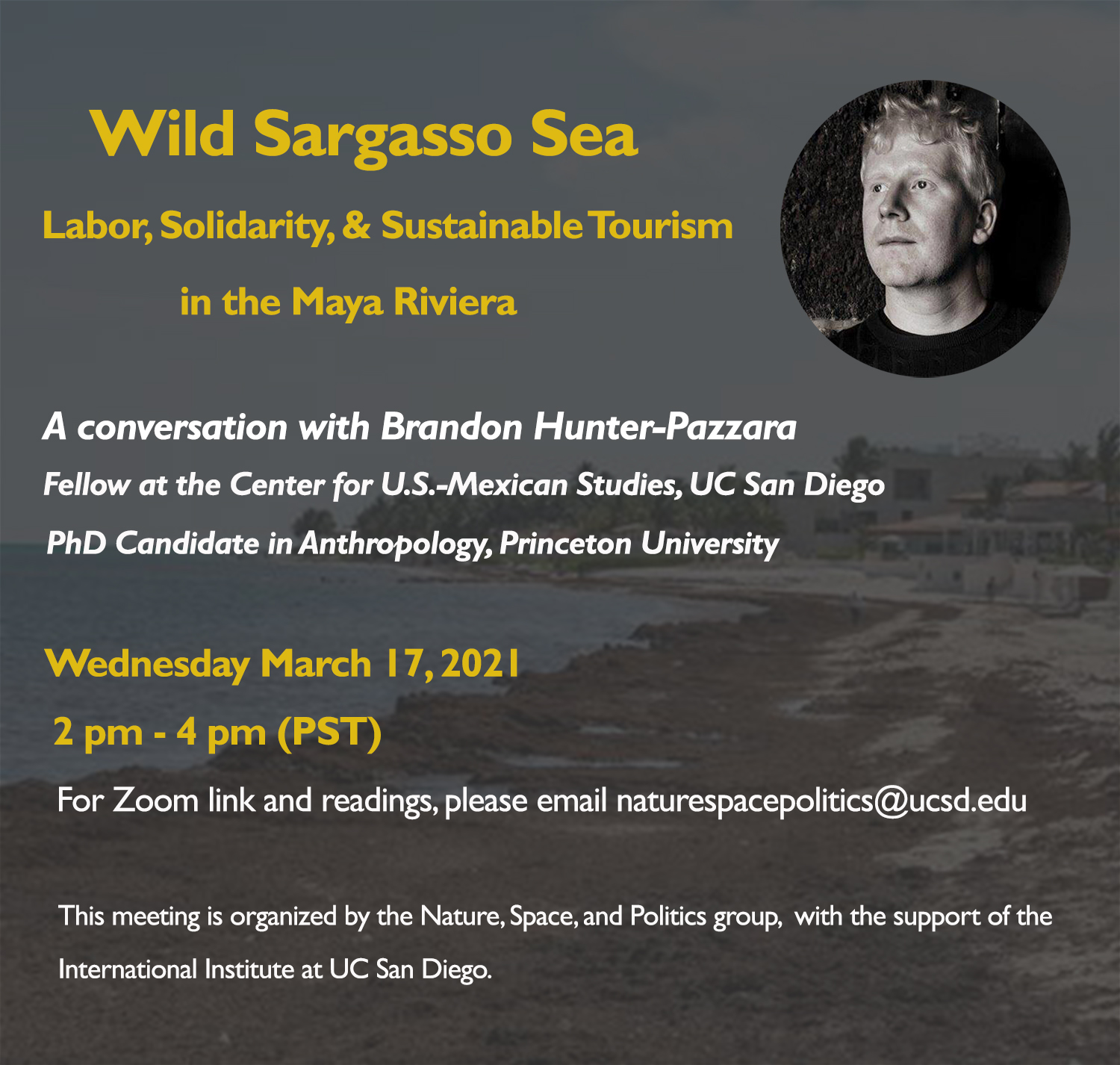
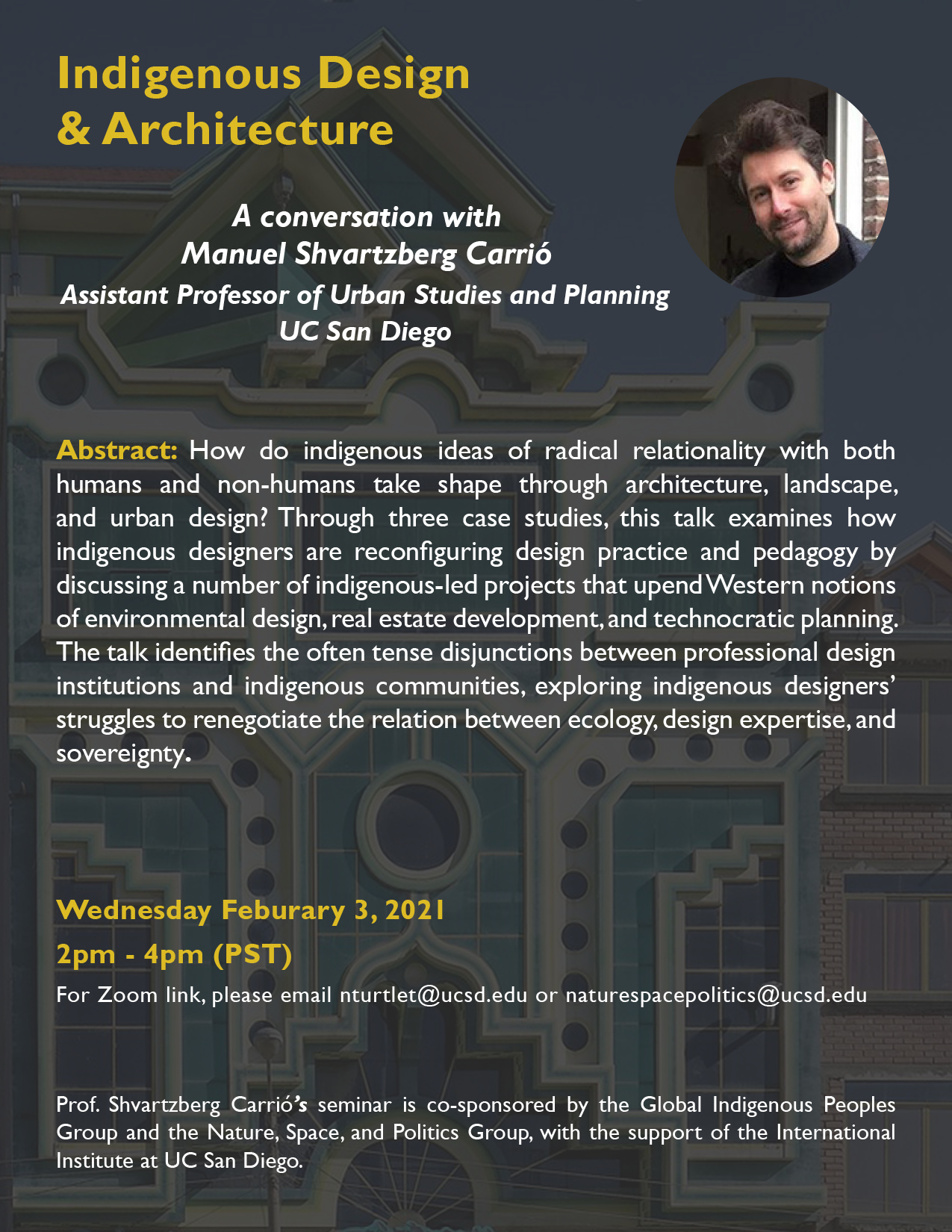
Guest Speaker Prof. Manuel Shvartzberg Carrió (UC San Diego) on Wednesday, Feb 3rd, 2021 (2 p.m. - 4 p.m. PST @ zoom) - Prof. Shvartzberg Carrió, Assistant Professor of Urban Studies and Planning, will be talking about his work Indigenous Design and Architecture in a seminar co-sponsored with the Global Indigenous Peoples Faculty and Graduate Research Group and organized by Nancy Postero.
Film Screening & Discussion on "The Strenght of Salt: Impact of Lithium Extraction on the Indigenous Communities of Salinas Grandes" (Argentina) on Friday Jan 29th, 2021 (10 a.m. - 12:30 p.m.PST @ zoom) - We are honored to co-sporsor this event with Latin American Studies Program, organized by Prof. Luis Martín-Cabrera. The event includes a documentary screening of "Kallapa Kachi" by Marina Ruiz, followed by discussion in Spanish with the filmaker and panelists.
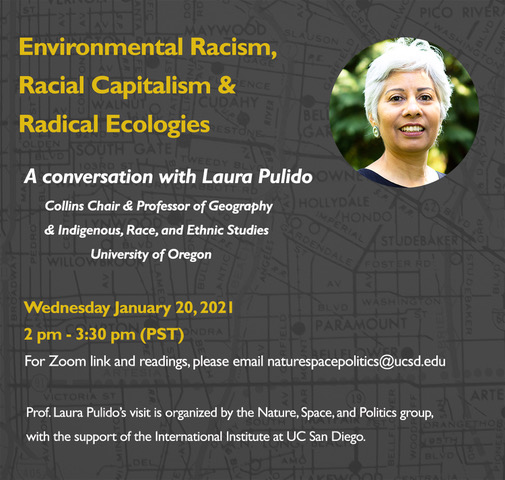
Guest Speaker Prof. Shelley Streeby (UC San Diego) on Wednesday Dec 9th, 2020 (2 p.m. - 3:30 p.m. PST @ zoom) - In December 2020, we were honored to welcome Prof. Shelley Streeby, Literature, UCSD, for a conversation about her most recent work Speculative Archives: Hidden Histories and Ecologies of Science Fiction World-Making (ACLS 2020-2021).
Utopianism of degrowth & Science Fiction Discussion on Wednesday Nov 4th, 2020 (2 p.m. - 3:30 p.m. PST @ zoom) - Reading and discussion of the utopianism of degrowth and science fiction engineering of new worlds. Readings are Kallis Girogios and Hug March, Imaginaries of Hope: The Utopianism of Degrowth (2014) and N.K. Jemisin's short story The City Born Great
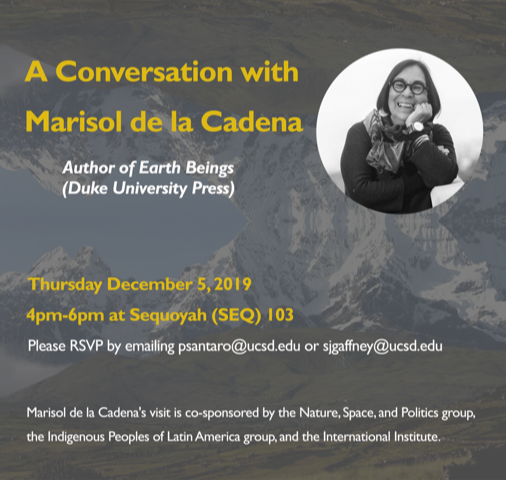 Guest Speaker Prof. Marisol de la Cadena (UC Davis) on Thursday Dec 5th, 2019 (4 p.m. - 6 p.m. @ Sequoyah Room 103) - In December 2019, we invited Prof. Marisol de la Cadena, author of Earth Beings (Duke), as our guest speaker. Marisol opened with some provocations to guide the group discussion, which was centered around two excerpts of Marisol's writing: Story 4 from Earth Beings, "Mariano's Archive: The Eventfulness of the Ahistorical"; and Chapter 1 from Anthropos and the Material, "Uncommoning Nature: Stories from the Anthropo-Not-Seen".
Guest Speaker Prof. Marisol de la Cadena (UC Davis) on Thursday Dec 5th, 2019 (4 p.m. - 6 p.m. @ Sequoyah Room 103) - In December 2019, we invited Prof. Marisol de la Cadena, author of Earth Beings (Duke), as our guest speaker. Marisol opened with some provocations to guide the group discussion, which was centered around two excerpts of Marisol's writing: Story 4 from Earth Beings, "Mariano's Archive: The Eventfulness of the Ahistorical"; and Chapter 1 from Anthropos and the Material, "Uncommoning Nature: Stories from the Anthropo-Not-Seen".
Diverse Ways of Knowing Nature Workshop

Urban Waterscapes Workshop
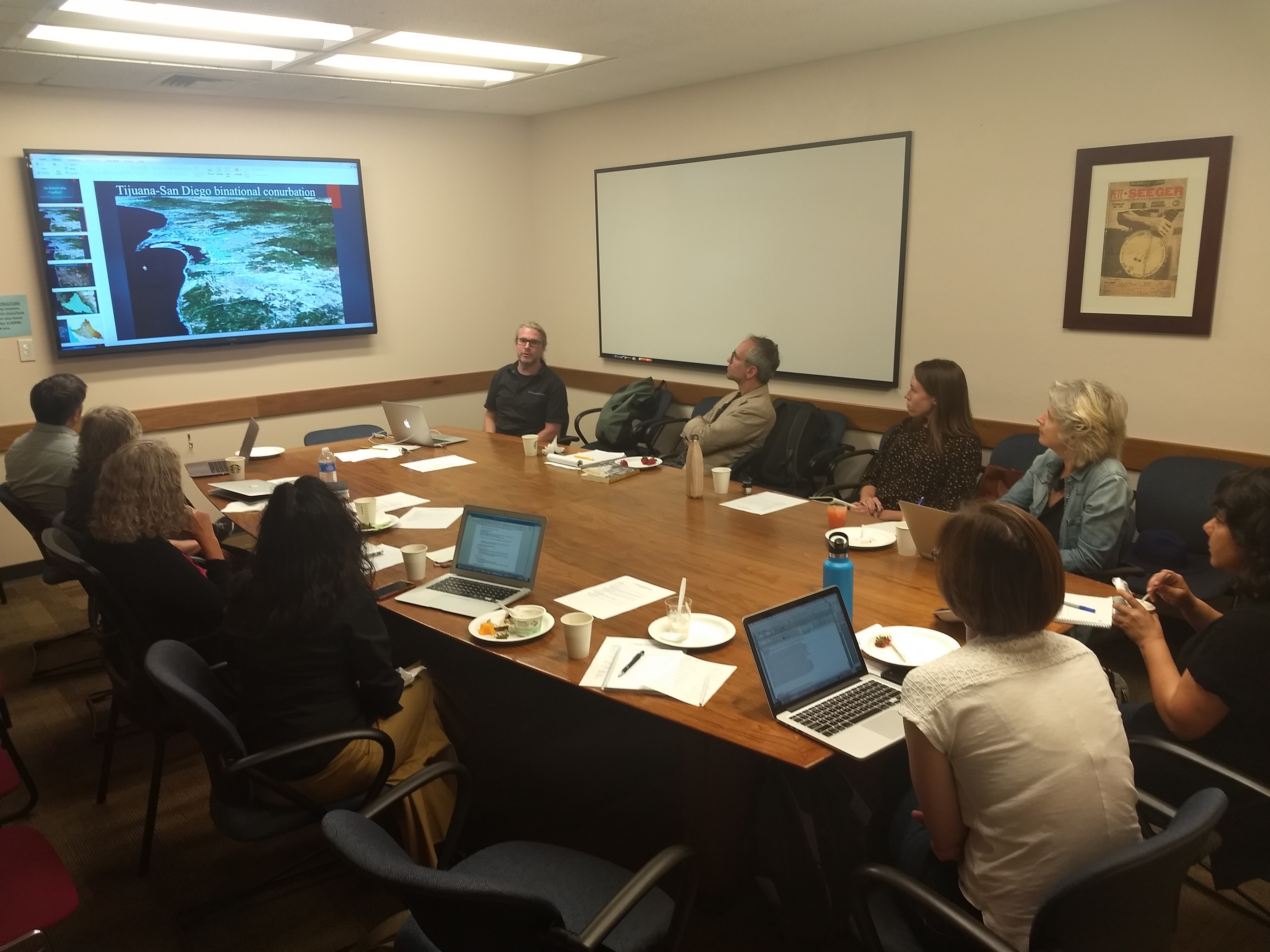 In June 2018, we organized a day long workshop on “Urban Water scapes” (June 2018) where we brought three guest speakers (Prof. Irene Klaver, Prof. Stephanie Kane, and Prof. Kim de Wolff) and where several of the members of the group (Prof. Elana Zilberg, Prof. Matt Vitz, Prof. Ameeth Vijay, Prof. Matilde Cordoba Azcarate and graduate student Kevan Malone) shared their work in progress. The workshop included a field-trip component as a binational tour in the Tijuana-San Diego estuary led by Oscar Romo of Alter Terra. See the Urban Waterscapes workshop program and participants' abstracts (PDF).
In June 2018, we organized a day long workshop on “Urban Water scapes” (June 2018) where we brought three guest speakers (Prof. Irene Klaver, Prof. Stephanie Kane, and Prof. Kim de Wolff) and where several of the members of the group (Prof. Elana Zilberg, Prof. Matt Vitz, Prof. Ameeth Vijay, Prof. Matilde Cordoba Azcarate and graduate student Kevan Malone) shared their work in progress. The workshop included a field-trip component as a binational tour in the Tijuana-San Diego estuary led by Oscar Romo of Alter Terra. See the Urban Waterscapes workshop program and participants' abstracts (PDF).